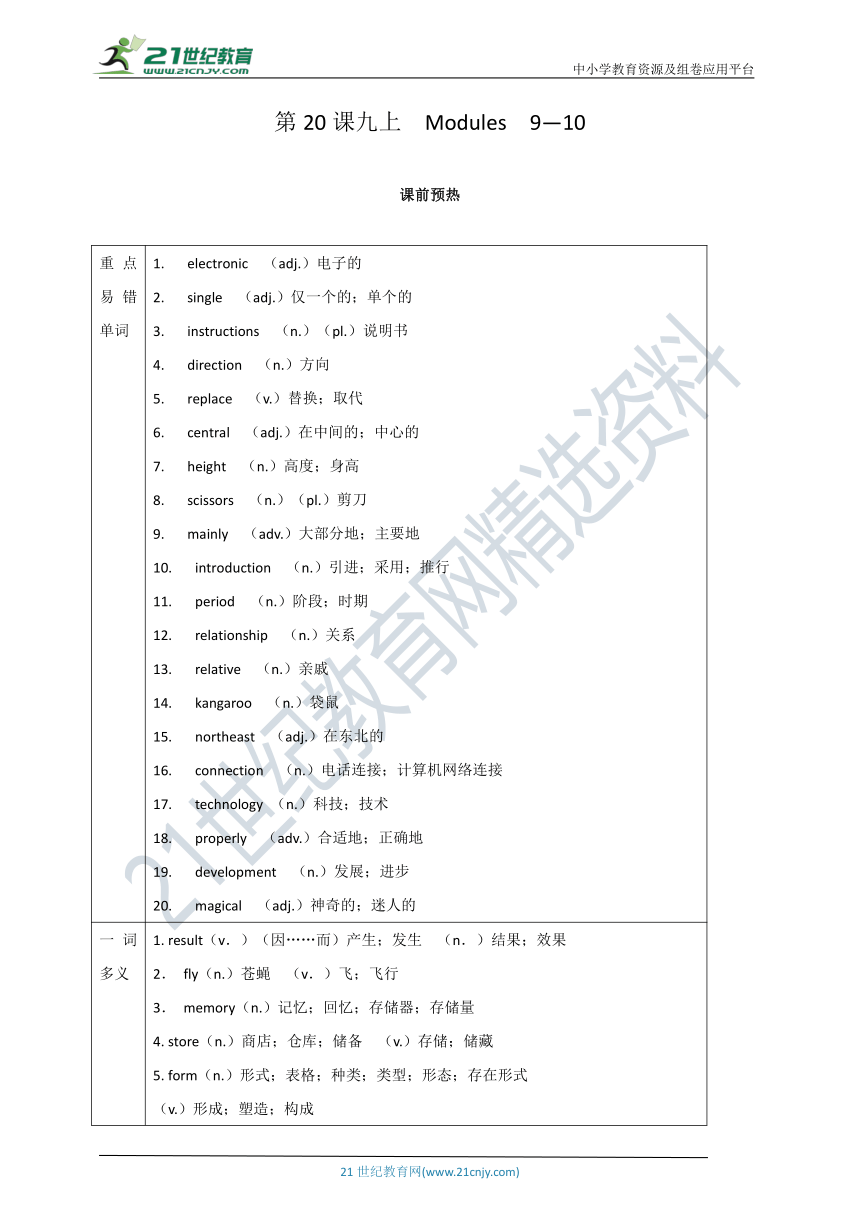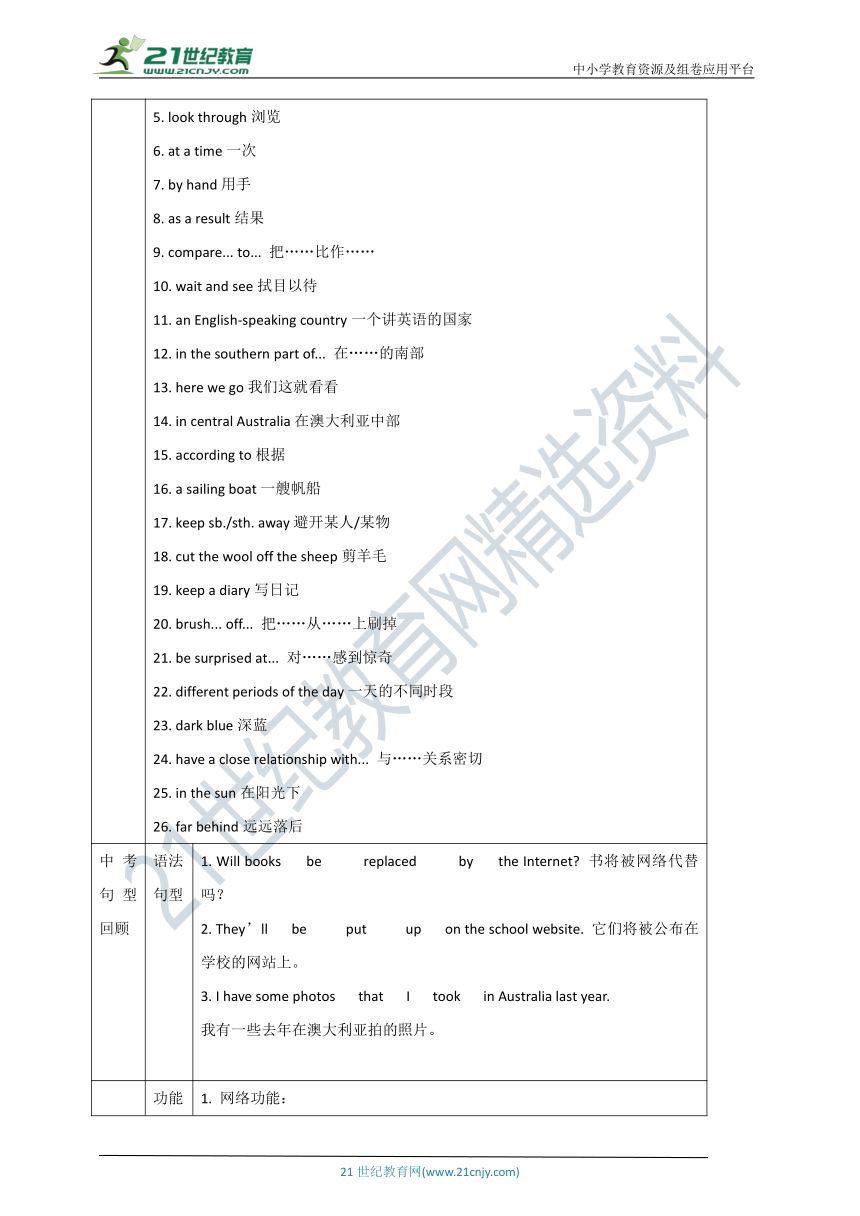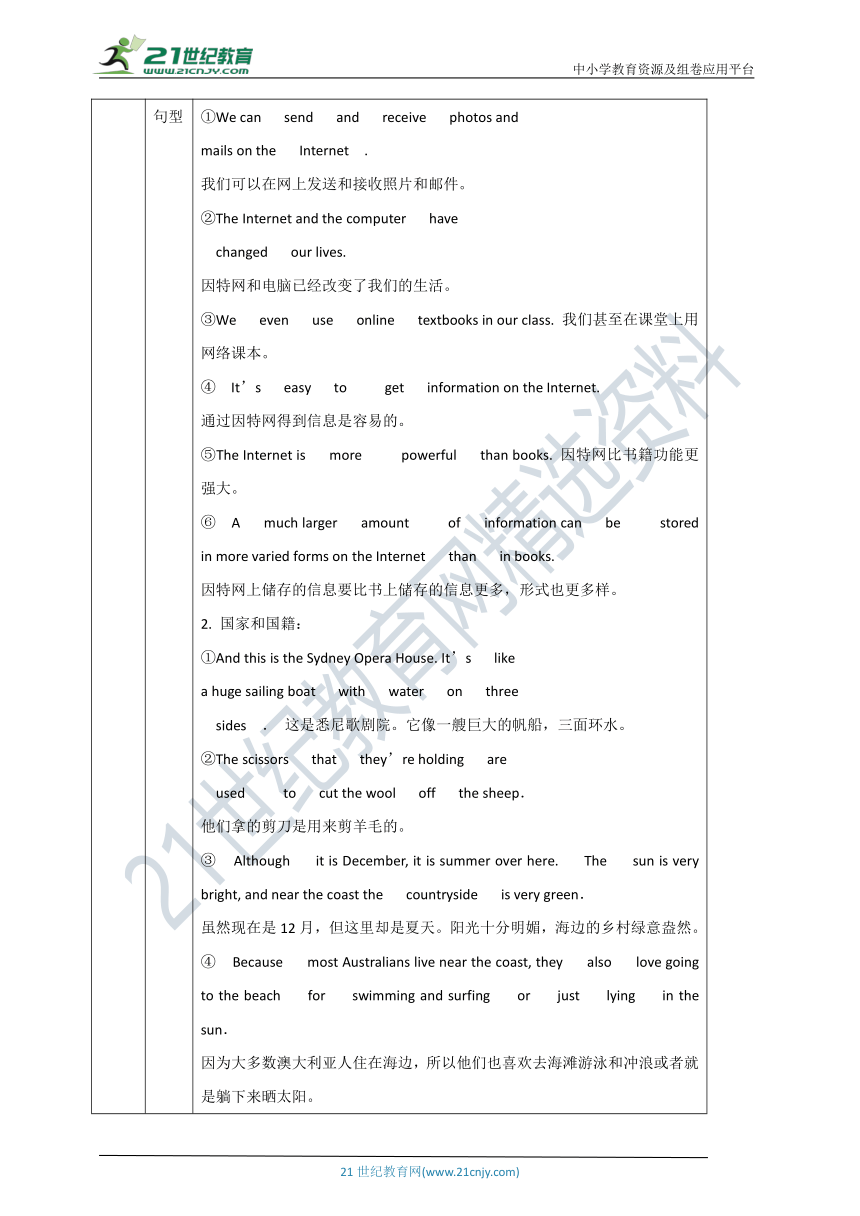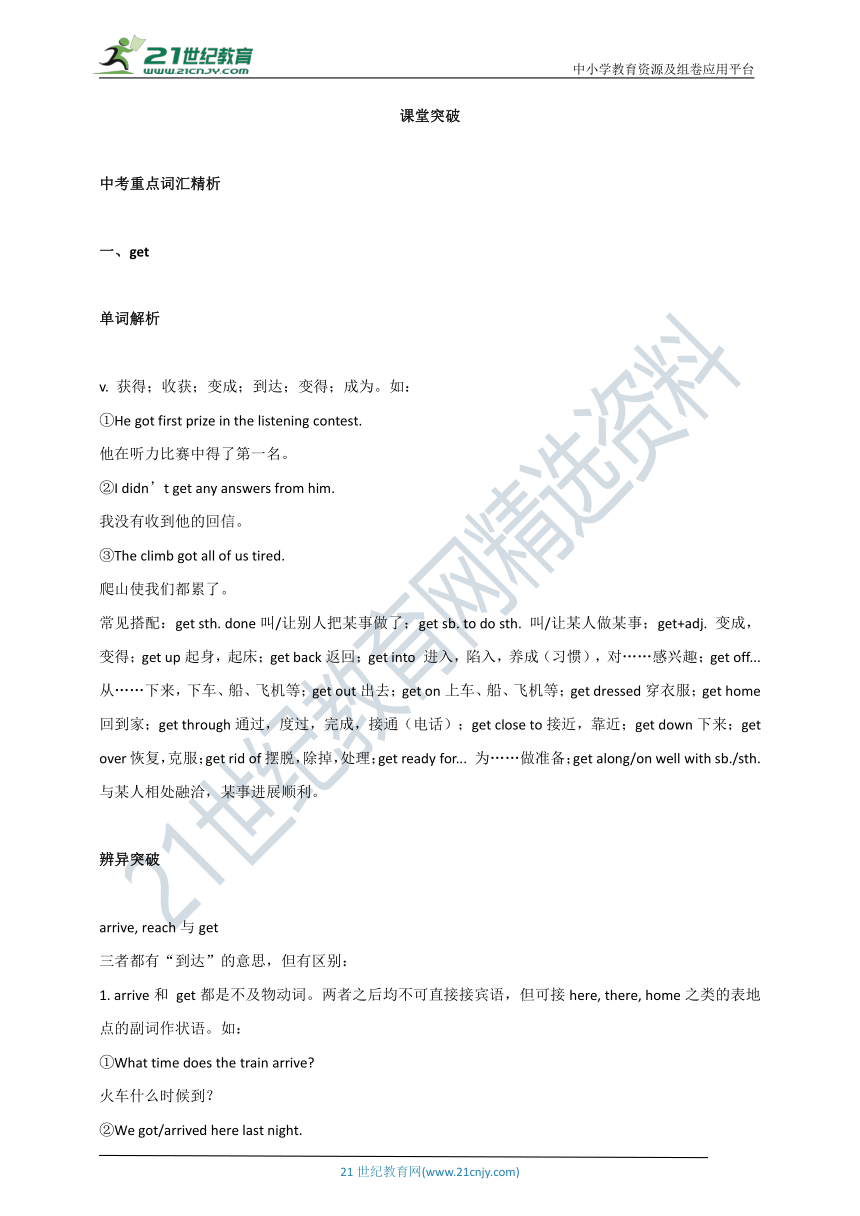外研版英语中考语言基础知识梳理与训练 第20课九年级上册 Modules 9—10
文档属性
| 名称 | 外研版英语中考语言基础知识梳理与训练 第20课九年级上册 Modules 9—10 |  | |
| 格式 | doc | ||
| 文件大小 | 1.3MB | ||
| 资源类型 | 试卷 | ||
| 版本资源 | 外研版 | ||
| 科目 | 英语 | ||
| 更新时间 | 2022-02-06 19:26:21 | ||
图片预览





文档简介
中小学教育资源及组卷应用平台
第20课九上 Modules 9—10
课前预热
重点易错单词 1. electronic (adj.)电子的2. single (adj.)仅一个的;单个的3. instructions (n.)(pl.)说明书4. direction (n.)方向5. replace (v.)替换;取代6. central (adj.)在中间的;中心的7. height (n.)高度;身高8. scissors (n.)(pl.)剪刀9. mainly (adv.)大部分地;主要地10. introduction (n.)引进;采用;推行11. period (n.)阶段;时期12. relationship (n.)关系13. relative (n.)亲戚14. kangaroo (n.)袋鼠15. northeast (adj.)在东北的16. connection (n.)电话连接;计算机网络连接17. technology (n.)科技;技术18. properly (adv.)合适地;正确地19. development (n.)发展;进步20. magical (adj.)神奇的;迷人的
一词多义 1. result(v.)(因……而)产生;发生 (n.)结果;效果2. fly(n.)苍蝇 (v.)飞;飞行3. memory(n.)记忆;回忆;存储器;存储量4. store(n.)商店;仓库;储备 (v.)存储;储藏5. form(n.)形式;表格;种类;类型;形态;存在形式(v.)形成;塑造;构成
词形变换 1. borrow(v.)→ lend (反义词)借出;借给(某人)2. main(adj.)→ mainly (adv.)主要地3. electronic(adj.)→ electricity (n.)电4. power(n.)→ powerful (adj.)有影响力的5. memory(n.)→ memories (pl.)存储器;存储量6. full(adj.)→ fill (v.)装满7. lazy(adj.)→ hard-working (反义词)勤奋的→ lazier (比较级)更懒的→ laziest (最高级)最懒的8. proper(adj.)→ properly (adv.)合适地;正确地9. print(v.)→ printing (n.)印刷 10. develop(v.)→ development (n.)发展;进步11. ride(v.)→ riding (n.)骑马运动12. introduce(v.)→ introduction (n.)引进;采用;推行13. connect(v.)→ connection (n.)电话连接;计算机网络连接14. centre(n.)→ central (adj.)中心的;在中间的15. high(adj.)→ height (n.)高度16. sheep(n.)→ sheep (pl.)羊;绵羊17. kangaroo(n.)→ kangaroos (pl.)袋鼠18. fly(n.)→ flies (pl.)苍蝇19. cut(v.)→ cutting (现在分词)切;割20. wool(n.)→ woollen/woolen (adj.)羊毛的21. diary(n.)→ diaries (pl.)日记22. brush(v.)→ brushes (第三人称单数一般现在式)(用刷子)刷23. surf(v.)→ surfing (n.)冲浪
中考词组短语 1. thousands of成千上万的2. a memory card一张存储卡3. lend sth. to sb. 把某物借给某人 =lend sb. sth. 借给某人某物4. on one’s way to... 在某人去……的路上5. look through浏览6. at a time一次7. by hand用手8. as a result结果9. compare... to... 把……比作……10. wait and see拭目以待11. an English-speaking country一个讲英语的国家12. in the southern part of... 在……的南部13. here we go我们这就看看14. in central Australia在澳大利亚中部15. according to根据 16. a sailing boat一艘帆船17. keep sb./sth. away避开某人/某物18. cut the wool off the sheep剪羊毛19. keep a diary写日记20. brush... off... 把……从……上刷掉21. be surprised at... 对……感到惊奇22. different periods of the day一天的不同时段23. dark blue深蓝24. have a close relationship with... 与……关系密切25. in the sun在阳光下26. far behind远远落后
中考句型回顾 语法句型 1. Will books be replaced by the Internet 书将被网络代替吗?2. They’ll be put up on the school website. 它们将被公布在学校的网站上。3. I have some photos that I took in Australia last year. 我有一些去年在澳大利亚拍的照片。
功能句型 1. 网络功能:①We can send and receive photos andmails on the Internet . 我们可以在网上发送和接收照片和邮件。②The Internet and the computer have changed our lives. 因特网和电脑已经改变了我们的生活。③We even use online textbooks in our class. 我们甚至在课堂上用网络课本。④ It’s easy to get information on the Internet. 通过因特网得到信息是容易的。⑤The Internet is more powerful than books. 因特网比书籍功能更强大。⑥ A much larger amount of information can be stored in more varied forms on the Internet than in books.因特网上储存的信息要比书上储存的信息更多,形式也更多样。2. 国家和国籍:①And this is the Sydney Opera House. It’s like a huge sailing boat with water on three sides . 这是悉尼歌剧院。它像一艘巨大的帆船,三面环水。②The scissors that they’re holding are used to cut the wool off the sheep.他们拿的剪刀是用来剪羊毛的。③ Although it is December, it is summer over here. The sun is very bright, and near the coast the countryside is very green.虽然现在是12月,但这里却是夏天。阳光十分明媚,海边的乡村绿意盎然。④ Because most Australians live near the coast, they also love going to the beach for swimming and surfing or just lying in the sun. 因为大多数澳大利亚人住在海边,所以他们也喜欢去海滩游泳和冲浪或者就是躺下来晒太阳。
课堂突破
中考重点词汇精析
一、get
单词解析
v. 获得;收获;变成;到达;变得;成为。如:
①He got first prize in the listening contest.
他在听力比赛中得了第一名。
②I didn’t get any answers from him.
我没有收到他的回信。
③The climb got all of us tired.
爬山使我们都累了。
常见搭配:get sth. done叫/让别人把某事做了;get sb. to do sth. 叫/让某人做某事;get+adj. 变成,变得;get up起身,起床;get back返回;get into 进入,陷入,养成(习惯),对……感兴趣;get off... 从……下来,下车、船、飞机等;get out出去;get on上车、船、飞机等;get dressed穿衣服;get home回到家;get through通过,度过,完成,接通(电话);get close to接近,靠近;get down下来;get over恢复,克服;get rid of摆脱,除掉,处理;get ready for... 为……做准备;get along/on well with sb./sth. 与某人相处融洽,某事进展顺利。
辨异突破
arrive, reach与get
三者都有“到达”的意思,但有区别:
1. arrive和 get都是不及物动词。两者之后均不可直接接宾语,但可接here, there, home之类的表地点的副词作状语。如:
①What time does the train arrive
火车什么时候到?
②We got/arrived here last night.
我们昨晚到达这儿。
要表示“到达某地”,其后需适当借助介词:
arrive之后通常接介词at(一般用于较小的地方)或in(一般用于较大的地方)。arrive后面也可以不跟地点。如:
①We arrived at the station five minutes late. 我们到车站晚了5分钟。
②They will arrive in Paris next Monday.
他们将于下星期一到达巴黎。
③When will you arrive 你什么时候到?
get之后通常接介词to。如:
When we got to the park, it began to rain.
当我们到达公园时,天开始下雨了。
2. reach通常是及物动词(较get更正式),其后可直接跟地点名词作宾语(不能用介词)。如:
He reached Beijing yesterday.
他昨天到达北京。
注:reach之后也可接here, there, home等词。如:
When did he reach home yesterday
昨天他什么时候到家?
活学活用
A)填入适当的词或用所给词的适当形式填空。
1. When did you get_________________ Hong Kong
2. I’ll get my hair_________________ (cut) tomorrow.
3. Get him_________________ (see) a doctor at once.
4. The weather is_________________ (get) warmer and warmer.
5. The boys had nothing to do and were getting_________________(bore).
B)用get, arrive或reach的适当形式填空。
6. They_________________ the mountaintop in the end.
7. We_________________ at the station five minutes late.
8. They will_________________ in New York at noon.
9. We_________________ to London at 7 o’clock.
10. We won’t_________________ Miami till five or six o’clock.
11. I_________________ here last Thursday morning.
12. I usually watch TV after I_________________ home.
13. It’s impolite to_________________ late.
14. Betty will ring me up when she_________________ in Shanghai.
15. When I_________________ at my office, it was nine o’clock.
二、lie
单词解析
1. v. 躺;平躺;说谎。如:
①He lay down for a rest.
他躺下来休息。
②She lied (to them) about her age in order to get the job.
她为了谋得那份工作(向他们)隐瞒了年龄。
2. n. 谎言。如:
The whole story is nothing but a pack of lies.
整个叙述只不过是一派谎言。
注意:
1. lie作为动词“躺;位于;被平放;处于某种状态”时,现在分词形式为lying,过去式为lay,过去分词为lain。
2. 作为动词“说谎”时,过去式和过去分词均为lied。常用搭配:lie to sb. 对某人撒谎。lie作为名词,意为“谎言”。常用搭配:tell a lie撒谎。
与lie容易混淆的词为lay。lay是动词,意为“放置;下(蛋)”。过去式和过去分词均为laid。如:
①They laid the injured woman (down) on the grass. 他们把受伤的女人放在草地上。
②Last week the hens laid 30 eggs, but this week they didn’t lay.
上星期那些母鸡下了三十个蛋,但本周没有下蛋。
辨异突破
lie in, lie to, lie on与lie off
1. lie in... 位于……。表示一个地方在另一个地方内部(包含)。如:
Guangdong lies in the south of China.
广东在中国的南部。
2. lie to... 位于……。表示两个位置之间一般是不接壤的。如:
Japan lies to the east of China.
日本在中国的东面。
3. lie on... 位于……。表示两个地区之间接壤的。如:
Scotland lies on the north of England.
苏格兰在英格兰的北部。
4. lie off... 位于……。表示两个地区隔了一定距离,可以用于海湾或是海峡之间,其中的off有near的意思。如:
lie off the coast 离海岸不远
活学活用
根据汉语意思翻译句子。
1. 一只躺在地上的公鸡撒谎说他昨天下了一个蛋。
A rooster_________________ on the ground_________________
that he_________________ an egg yesterday.
2. 他正躺在地板上看书。
He_________________ on the floor, reading a book.
3. 别一个上午都躺在床上。
Don’t_________________ in bed all morning.
4. 她已经在床上躺了三天。
She has_________________ in bed for three days.
5. 小镇位于群山之中。
The small town_________________ among the mountains.
三、borrow
单词解析
v. 借;借用。如:
Can I borrow your umbrella
借你的伞用一下行吗?
辨异突破
lend与borrow
1. lend借出。常用短语:lend sb. sth.=lend sth.
to sb. 借给某人某物。如:
I lent Wang Tao 20 yuan yesterday.
=I lent 20 yuan to Wang Tao yesterday.
昨天我借给王涛二十元钱。
2. borrow借进。常用短语:borrow sth. from sb.
向某人借某物。borrow是短暂性动词,因此要表达“借了某物多长时间”,要将borrow改为延续性动词keep。如:
①Wang Tao borrowed 20 yuan from me yesterday. 王涛昨天向我借了二十元钱。
②I have kept the book for two weeks.
这本书我借来两个星期了。
活学活用
A)根据汉语意思翻译句子。
1. 我向玛丽借了一本词典。
I_________________ a dictionary_________________ Mary.
2. 他没有把书借给我。
He didn’t_________________ his book_________________ me.
3. 这本书你可以借两个星期。
You may_________________ the book_________________ two weeks.
B)用borrow, lend或keep的适当形式填空。
4. May I_________________ your bike
5. Sorry, I have_________________ it to Li Ping.
6. You can_________________ one from Lucy.
7. I can_________________ you my bike.
8. You can_________________ it for three weeks.
中考重点句型精析
一、Will books be replaced by the Internet
书籍将会被因特网取代吗?
句型解析
这是will引导的一般将来时的被动语态,其结构如下:
(1)肯定式:主语+will/shall+be+动词的过去分词.
(2)否定式:主语+will/shall+not+be+动词的过去分词.
(3)一般疑问式:Will/Shall+主语+be+动词的过去分词?
简略回答:Yes,主语+will/shall./No,主语+won’t/shan’t.
(4)特殊疑问式:特殊疑问词+will/shall+主语+be+动词的过去分词?
回答按照实际情况。
例句如下:
肯定句:A new school will be built up here.
否定句:A new school will not/won’t be built up here.
疑问句及简略回答:
—Will a new school be built up here
—Yes, it will./No, it won’t.
特殊疑问句及回答:
—What will be built up here
—A new school.
温馨提示:使用一般将来时的被动语态时,应注意以下两点:
(1)在时间、条件状语从句中,应使用现在时表示将来。同样,应使用现在时的被动语态表示将来时的被动语态。如:
He says he will leave the company if he is punished for this.
他说如果他因此受处罚的话,他将离开这个公司。
(2)使用一般将来时的被动语态时,易遗漏被动式中的be。如:
下周有一部新电影将在电影院上映。
A new film will shown at the cinema next week. ( × )
A new film will be shown at the cinema next week. ( √ )
活学活用
A)用next year改写句子。
1. The house was built in 2009.
The house_________________ next year.
B)对画线部分提问。
2. The sports meeting will be held next Friday.
_________________ the sports meeting_________________ held
C)改为一般疑问句,并作否定回答。
3. The film will be shown tomorrow.
—_________________ the film_________________ tomorrow
—No, it_________________ .
二、The horse that I rode was lazy.
我骑的那匹马很懒。
句型解析
这是含有定语从句“... that I rode”的复合句。被修饰的词“The horse”叫先行词。
定语从句放在先行词之后,一般由关系代词来引导。关系代词that可以引导限定性定语从句,修饰前面的先行词,that可以充当从句的主语、宾语或表语。
当关系词that在定语从句中作主语时,that不能省略;当关系词that在定语从句中作宾语时,that可以省略。如:
①The bag that lies on the ground is hers.
地上的那个包是她的。(that充当主语不可省略)
②The old man (that) I visited yesterday is my teacher. 我昨天拜访的那个老人是我的老师。(that充当宾语可省略)
③Is he the man that wants to see you
他就是想见你的人吗?(that充当主语不可省略)
活学活用
将下列每组句子合并为一句。
1. The girl is my sister. The girl has long hair.
The girl that_________________ is my sister.
2. I have a cat. The cat has big eyes.
I have a cat that_________________ eyes.
当堂检测
一、选词填空
用方框中所给词语的适当形式填空。每词限用一次。
store result main single look through
1. The people in the hotel were_________________ foreign tourists.
2. You may_________________ your documents in your U-disk.
3. There’s nothing but a_________________ bed in his room.
4. Peter starts_________________ the mail as soon as the door shuts.
5. Many hair problems_________________ from what you eat.
二、单词拼写
1. My home town_________________ (位于) in the east of China.
2. She has a very close_________________ (关系) with her sister.
3. There are twelve modules in our English_________________(课本).
4. At that time fear_________________ (传播) through the crowd quickly.
5. She_________________ (借) £2,000 from her parents last month.
6. The television isn’t working_________________ (合适地;正确地).
7. We are spending 850 million dollars on research and_________________ (发展).
8. They hit a truck coming in the opposite________________(方向).
9. Teachers will never be_________________ (代替) by computers in the classroom.
10. Modern_________________ (科技) has changed many things in our lives.
三、语法填空
阅读下面短文,在空白处填入一个适当的词,或填入括号中所给单词的正确形式。
Next time you hold a book in your hands, stop and think. Like most other things in the modern world, it is the result of thousands of years of human invention.
First, came the invention of writing, 1_________________(probable) about 5,500 years ago. With writing, people did not have to remember everything in their heads. They could communicate with people that they never 2_________________(see) and share their knowledge with future generations.
Later, the Greeks were well-known for their literature(文学) and science, but their “books” looked very different 3_________________ the books of today. They were called scrolls(卷轴). They were difficult to use and took a lot of space in a library. About 2,000 years ago, books with lots of pages 4_________________(invent).
For more than a thousand years, the pages of books were made from animal skin. That changed in 5_________________ thirteenth century, when Europeans learnt about a very 6_________________(use) Chinese invention: paper.
But the biggest change for books in Europe came in 1439, when Johannes Gutenberg invented the printing press. Before that, books in Europe were copied by hand, so they were very expensive. Many more people could afford the books 7_________________were produced on a printing press.
These days it is difficult 8_________________(imagine) a world without books. But human invention does not stop. Every year, more 9_________________(story) are bought as e-books and read on a screen.
Will anyone turn the pages of a traditional book in the future, 10_________________ will books, like scrolls, soon disappear
参考答案
第20课 九上 Modules 9—10
课堂突破
【中考重点词汇精析】
一、1. to 2. cut 3. to see 4. getting 5. bored 6. reached
7. arrived 8. arrive 9. got 10. reach 11. arrived/got/reached
12. arrive/get/reach 13. arrive 14. arrives 15. arrived
二、1. lying, lied, laid 2. is lying 3. lie 4. lain 5. lies
三、1. borrowed, from 2. lend, to 3. keep, for 4. borrow
5. lent 6. borrow 7. lend 8. keep
【中考重点句型精析】
一、1. will be built 2. When will, be
3. Will, be shown, won’t
二、1. has long hair 2. has big
当堂检测
一、1. mainly 2. store 3. single
4. looking through/to look through 5. result
二、1. lies 2. relationship 3. textbook 4. spread 5. borrowed
6. properly 7. development 8. direction 9. replaced
10. technology
三、1. probably 2. saw 3. from 4. were invented 5. the
6. useful 7. that/which 8. to imagine 9. stories 10. or
21世纪教育网 www.21cnjy.com 精品试卷·第 2 页 (共 2 页)
HYPERLINK "http://21世纪教育网(www.21cnjy.com)
" 21世纪教育网(www.21cnjy.com)
第20课九上 Modules 9—10
课前预热
重点易错单词 1. electronic (adj.)电子的2. single (adj.)仅一个的;单个的3. instructions (n.)(pl.)说明书4. direction (n.)方向5. replace (v.)替换;取代6. central (adj.)在中间的;中心的7. height (n.)高度;身高8. scissors (n.)(pl.)剪刀9. mainly (adv.)大部分地;主要地10. introduction (n.)引进;采用;推行11. period (n.)阶段;时期12. relationship (n.)关系13. relative (n.)亲戚14. kangaroo (n.)袋鼠15. northeast (adj.)在东北的16. connection (n.)电话连接;计算机网络连接17. technology (n.)科技;技术18. properly (adv.)合适地;正确地19. development (n.)发展;进步20. magical (adj.)神奇的;迷人的
一词多义 1. result(v.)(因……而)产生;发生 (n.)结果;效果2. fly(n.)苍蝇 (v.)飞;飞行3. memory(n.)记忆;回忆;存储器;存储量4. store(n.)商店;仓库;储备 (v.)存储;储藏5. form(n.)形式;表格;种类;类型;形态;存在形式(v.)形成;塑造;构成
词形变换 1. borrow(v.)→ lend (反义词)借出;借给(某人)2. main(adj.)→ mainly (adv.)主要地3. electronic(adj.)→ electricity (n.)电4. power(n.)→ powerful (adj.)有影响力的5. memory(n.)→ memories (pl.)存储器;存储量6. full(adj.)→ fill (v.)装满7. lazy(adj.)→ hard-working (反义词)勤奋的→ lazier (比较级)更懒的→ laziest (最高级)最懒的8. proper(adj.)→ properly (adv.)合适地;正确地9. print(v.)→ printing (n.)印刷 10. develop(v.)→ development (n.)发展;进步11. ride(v.)→ riding (n.)骑马运动12. introduce(v.)→ introduction (n.)引进;采用;推行13. connect(v.)→ connection (n.)电话连接;计算机网络连接14. centre(n.)→ central (adj.)中心的;在中间的15. high(adj.)→ height (n.)高度16. sheep(n.)→ sheep (pl.)羊;绵羊17. kangaroo(n.)→ kangaroos (pl.)袋鼠18. fly(n.)→ flies (pl.)苍蝇19. cut(v.)→ cutting (现在分词)切;割20. wool(n.)→ woollen/woolen (adj.)羊毛的21. diary(n.)→ diaries (pl.)日记22. brush(v.)→ brushes (第三人称单数一般现在式)(用刷子)刷23. surf(v.)→ surfing (n.)冲浪
中考词组短语 1. thousands of成千上万的2. a memory card一张存储卡3. lend sth. to sb. 把某物借给某人 =lend sb. sth. 借给某人某物4. on one’s way to... 在某人去……的路上5. look through浏览6. at a time一次7. by hand用手8. as a result结果9. compare... to... 把……比作……10. wait and see拭目以待11. an English-speaking country一个讲英语的国家12. in the southern part of... 在……的南部13. here we go我们这就看看14. in central Australia在澳大利亚中部15. according to根据 16. a sailing boat一艘帆船17. keep sb./sth. away避开某人/某物18. cut the wool off the sheep剪羊毛19. keep a diary写日记20. brush... off... 把……从……上刷掉21. be surprised at... 对……感到惊奇22. different periods of the day一天的不同时段23. dark blue深蓝24. have a close relationship with... 与……关系密切25. in the sun在阳光下26. far behind远远落后
中考句型回顾 语法句型 1. Will books be replaced by the Internet 书将被网络代替吗?2. They’ll be put up on the school website. 它们将被公布在学校的网站上。3. I have some photos that I took in Australia last year. 我有一些去年在澳大利亚拍的照片。
功能句型 1. 网络功能:①We can send and receive photos andmails on the Internet . 我们可以在网上发送和接收照片和邮件。②The Internet and the computer have changed our lives. 因特网和电脑已经改变了我们的生活。③We even use online textbooks in our class. 我们甚至在课堂上用网络课本。④ It’s easy to get information on the Internet. 通过因特网得到信息是容易的。⑤The Internet is more powerful than books. 因特网比书籍功能更强大。⑥ A much larger amount of information can be stored in more varied forms on the Internet than in books.因特网上储存的信息要比书上储存的信息更多,形式也更多样。2. 国家和国籍:①And this is the Sydney Opera House. It’s like a huge sailing boat with water on three sides . 这是悉尼歌剧院。它像一艘巨大的帆船,三面环水。②The scissors that they’re holding are used to cut the wool off the sheep.他们拿的剪刀是用来剪羊毛的。③ Although it is December, it is summer over here. The sun is very bright, and near the coast the countryside is very green.虽然现在是12月,但这里却是夏天。阳光十分明媚,海边的乡村绿意盎然。④ Because most Australians live near the coast, they also love going to the beach for swimming and surfing or just lying in the sun. 因为大多数澳大利亚人住在海边,所以他们也喜欢去海滩游泳和冲浪或者就是躺下来晒太阳。
课堂突破
中考重点词汇精析
一、get
单词解析
v. 获得;收获;变成;到达;变得;成为。如:
①He got first prize in the listening contest.
他在听力比赛中得了第一名。
②I didn’t get any answers from him.
我没有收到他的回信。
③The climb got all of us tired.
爬山使我们都累了。
常见搭配:get sth. done叫/让别人把某事做了;get sb. to do sth. 叫/让某人做某事;get+adj. 变成,变得;get up起身,起床;get back返回;get into 进入,陷入,养成(习惯),对……感兴趣;get off... 从……下来,下车、船、飞机等;get out出去;get on上车、船、飞机等;get dressed穿衣服;get home回到家;get through通过,度过,完成,接通(电话);get close to接近,靠近;get down下来;get over恢复,克服;get rid of摆脱,除掉,处理;get ready for... 为……做准备;get along/on well with sb./sth. 与某人相处融洽,某事进展顺利。
辨异突破
arrive, reach与get
三者都有“到达”的意思,但有区别:
1. arrive和 get都是不及物动词。两者之后均不可直接接宾语,但可接here, there, home之类的表地点的副词作状语。如:
①What time does the train arrive
火车什么时候到?
②We got/arrived here last night.
我们昨晚到达这儿。
要表示“到达某地”,其后需适当借助介词:
arrive之后通常接介词at(一般用于较小的地方)或in(一般用于较大的地方)。arrive后面也可以不跟地点。如:
①We arrived at the station five minutes late. 我们到车站晚了5分钟。
②They will arrive in Paris next Monday.
他们将于下星期一到达巴黎。
③When will you arrive 你什么时候到?
get之后通常接介词to。如:
When we got to the park, it began to rain.
当我们到达公园时,天开始下雨了。
2. reach通常是及物动词(较get更正式),其后可直接跟地点名词作宾语(不能用介词)。如:
He reached Beijing yesterday.
他昨天到达北京。
注:reach之后也可接here, there, home等词。如:
When did he reach home yesterday
昨天他什么时候到家?
活学活用
A)填入适当的词或用所给词的适当形式填空。
1. When did you get_________________ Hong Kong
2. I’ll get my hair_________________ (cut) tomorrow.
3. Get him_________________ (see) a doctor at once.
4. The weather is_________________ (get) warmer and warmer.
5. The boys had nothing to do and were getting_________________(bore).
B)用get, arrive或reach的适当形式填空。
6. They_________________ the mountaintop in the end.
7. We_________________ at the station five minutes late.
8. They will_________________ in New York at noon.
9. We_________________ to London at 7 o’clock.
10. We won’t_________________ Miami till five or six o’clock.
11. I_________________ here last Thursday morning.
12. I usually watch TV after I_________________ home.
13. It’s impolite to_________________ late.
14. Betty will ring me up when she_________________ in Shanghai.
15. When I_________________ at my office, it was nine o’clock.
二、lie
单词解析
1. v. 躺;平躺;说谎。如:
①He lay down for a rest.
他躺下来休息。
②She lied (to them) about her age in order to get the job.
她为了谋得那份工作(向他们)隐瞒了年龄。
2. n. 谎言。如:
The whole story is nothing but a pack of lies.
整个叙述只不过是一派谎言。
注意:
1. lie作为动词“躺;位于;被平放;处于某种状态”时,现在分词形式为lying,过去式为lay,过去分词为lain。
2. 作为动词“说谎”时,过去式和过去分词均为lied。常用搭配:lie to sb. 对某人撒谎。lie作为名词,意为“谎言”。常用搭配:tell a lie撒谎。
与lie容易混淆的词为lay。lay是动词,意为“放置;下(蛋)”。过去式和过去分词均为laid。如:
①They laid the injured woman (down) on the grass. 他们把受伤的女人放在草地上。
②Last week the hens laid 30 eggs, but this week they didn’t lay.
上星期那些母鸡下了三十个蛋,但本周没有下蛋。
辨异突破
lie in, lie to, lie on与lie off
1. lie in... 位于……。表示一个地方在另一个地方内部(包含)。如:
Guangdong lies in the south of China.
广东在中国的南部。
2. lie to... 位于……。表示两个位置之间一般是不接壤的。如:
Japan lies to the east of China.
日本在中国的东面。
3. lie on... 位于……。表示两个地区之间接壤的。如:
Scotland lies on the north of England.
苏格兰在英格兰的北部。
4. lie off... 位于……。表示两个地区隔了一定距离,可以用于海湾或是海峡之间,其中的off有near的意思。如:
lie off the coast 离海岸不远
活学活用
根据汉语意思翻译句子。
1. 一只躺在地上的公鸡撒谎说他昨天下了一个蛋。
A rooster_________________ on the ground_________________
that he_________________ an egg yesterday.
2. 他正躺在地板上看书。
He_________________ on the floor, reading a book.
3. 别一个上午都躺在床上。
Don’t_________________ in bed all morning.
4. 她已经在床上躺了三天。
She has_________________ in bed for three days.
5. 小镇位于群山之中。
The small town_________________ among the mountains.
三、borrow
单词解析
v. 借;借用。如:
Can I borrow your umbrella
借你的伞用一下行吗?
辨异突破
lend与borrow
1. lend借出。常用短语:lend sb. sth.=lend sth.
to sb. 借给某人某物。如:
I lent Wang Tao 20 yuan yesterday.
=I lent 20 yuan to Wang Tao yesterday.
昨天我借给王涛二十元钱。
2. borrow借进。常用短语:borrow sth. from sb.
向某人借某物。borrow是短暂性动词,因此要表达“借了某物多长时间”,要将borrow改为延续性动词keep。如:
①Wang Tao borrowed 20 yuan from me yesterday. 王涛昨天向我借了二十元钱。
②I have kept the book for two weeks.
这本书我借来两个星期了。
活学活用
A)根据汉语意思翻译句子。
1. 我向玛丽借了一本词典。
I_________________ a dictionary_________________ Mary.
2. 他没有把书借给我。
He didn’t_________________ his book_________________ me.
3. 这本书你可以借两个星期。
You may_________________ the book_________________ two weeks.
B)用borrow, lend或keep的适当形式填空。
4. May I_________________ your bike
5. Sorry, I have_________________ it to Li Ping.
6. You can_________________ one from Lucy.
7. I can_________________ you my bike.
8. You can_________________ it for three weeks.
中考重点句型精析
一、Will books be replaced by the Internet
书籍将会被因特网取代吗?
句型解析
这是will引导的一般将来时的被动语态,其结构如下:
(1)肯定式:主语+will/shall+be+动词的过去分词.
(2)否定式:主语+will/shall+not+be+动词的过去分词.
(3)一般疑问式:Will/Shall+主语+be+动词的过去分词?
简略回答:Yes,主语+will/shall./No,主语+won’t/shan’t.
(4)特殊疑问式:特殊疑问词+will/shall+主语+be+动词的过去分词?
回答按照实际情况。
例句如下:
肯定句:A new school will be built up here.
否定句:A new school will not/won’t be built up here.
疑问句及简略回答:
—Will a new school be built up here
—Yes, it will./No, it won’t.
特殊疑问句及回答:
—What will be built up here
—A new school.
温馨提示:使用一般将来时的被动语态时,应注意以下两点:
(1)在时间、条件状语从句中,应使用现在时表示将来。同样,应使用现在时的被动语态表示将来时的被动语态。如:
He says he will leave the company if he is punished for this.
他说如果他因此受处罚的话,他将离开这个公司。
(2)使用一般将来时的被动语态时,易遗漏被动式中的be。如:
下周有一部新电影将在电影院上映。
A new film will shown at the cinema next week. ( × )
A new film will be shown at the cinema next week. ( √ )
活学活用
A)用next year改写句子。
1. The house was built in 2009.
The house_________________ next year.
B)对画线部分提问。
2. The sports meeting will be held next Friday.
_________________ the sports meeting_________________ held
C)改为一般疑问句,并作否定回答。
3. The film will be shown tomorrow.
—_________________ the film_________________ tomorrow
—No, it_________________ .
二、The horse that I rode was lazy.
我骑的那匹马很懒。
句型解析
这是含有定语从句“... that I rode”的复合句。被修饰的词“The horse”叫先行词。
定语从句放在先行词之后,一般由关系代词来引导。关系代词that可以引导限定性定语从句,修饰前面的先行词,that可以充当从句的主语、宾语或表语。
当关系词that在定语从句中作主语时,that不能省略;当关系词that在定语从句中作宾语时,that可以省略。如:
①The bag that lies on the ground is hers.
地上的那个包是她的。(that充当主语不可省略)
②The old man (that) I visited yesterday is my teacher. 我昨天拜访的那个老人是我的老师。(that充当宾语可省略)
③Is he the man that wants to see you
他就是想见你的人吗?(that充当主语不可省略)
活学活用
将下列每组句子合并为一句。
1. The girl is my sister. The girl has long hair.
The girl that_________________ is my sister.
2. I have a cat. The cat has big eyes.
I have a cat that_________________ eyes.
当堂检测
一、选词填空
用方框中所给词语的适当形式填空。每词限用一次。
store result main single look through
1. The people in the hotel were_________________ foreign tourists.
2. You may_________________ your documents in your U-disk.
3. There’s nothing but a_________________ bed in his room.
4. Peter starts_________________ the mail as soon as the door shuts.
5. Many hair problems_________________ from what you eat.
二、单词拼写
1. My home town_________________ (位于) in the east of China.
2. She has a very close_________________ (关系) with her sister.
3. There are twelve modules in our English_________________(课本).
4. At that time fear_________________ (传播) through the crowd quickly.
5. She_________________ (借) £2,000 from her parents last month.
6. The television isn’t working_________________ (合适地;正确地).
7. We are spending 850 million dollars on research and_________________ (发展).
8. They hit a truck coming in the opposite________________(方向).
9. Teachers will never be_________________ (代替) by computers in the classroom.
10. Modern_________________ (科技) has changed many things in our lives.
三、语法填空
阅读下面短文,在空白处填入一个适当的词,或填入括号中所给单词的正确形式。
Next time you hold a book in your hands, stop and think. Like most other things in the modern world, it is the result of thousands of years of human invention.
First, came the invention of writing, 1_________________(probable) about 5,500 years ago. With writing, people did not have to remember everything in their heads. They could communicate with people that they never 2_________________(see) and share their knowledge with future generations.
Later, the Greeks were well-known for their literature(文学) and science, but their “books” looked very different 3_________________ the books of today. They were called scrolls(卷轴). They were difficult to use and took a lot of space in a library. About 2,000 years ago, books with lots of pages 4_________________(invent).
For more than a thousand years, the pages of books were made from animal skin. That changed in 5_________________ thirteenth century, when Europeans learnt about a very 6_________________(use) Chinese invention: paper.
But the biggest change for books in Europe came in 1439, when Johannes Gutenberg invented the printing press. Before that, books in Europe were copied by hand, so they were very expensive. Many more people could afford the books 7_________________were produced on a printing press.
These days it is difficult 8_________________(imagine) a world without books. But human invention does not stop. Every year, more 9_________________(story) are bought as e-books and read on a screen.
Will anyone turn the pages of a traditional book in the future, 10_________________ will books, like scrolls, soon disappear
参考答案
第20课 九上 Modules 9—10
课堂突破
【中考重点词汇精析】
一、1. to 2. cut 3. to see 4. getting 5. bored 6. reached
7. arrived 8. arrive 9. got 10. reach 11. arrived/got/reached
12. arrive/get/reach 13. arrive 14. arrives 15. arrived
二、1. lying, lied, laid 2. is lying 3. lie 4. lain 5. lies
三、1. borrowed, from 2. lend, to 3. keep, for 4. borrow
5. lent 6. borrow 7. lend 8. keep
【中考重点句型精析】
一、1. will be built 2. When will, be
3. Will, be shown, won’t
二、1. has long hair 2. has big
当堂检测
一、1. mainly 2. store 3. single
4. looking through/to look through 5. result
二、1. lies 2. relationship 3. textbook 4. spread 5. borrowed
6. properly 7. development 8. direction 9. replaced
10. technology
三、1. probably 2. saw 3. from 4. were invented 5. the
6. useful 7. that/which 8. to imagine 9. stories 10. or
21世纪教育网 www.21cnjy.com 精品试卷·第 2 页 (共 2 页)
HYPERLINK "http://21世纪教育网(www.21cnjy.com)
" 21世纪教育网(www.21cnjy.com)
